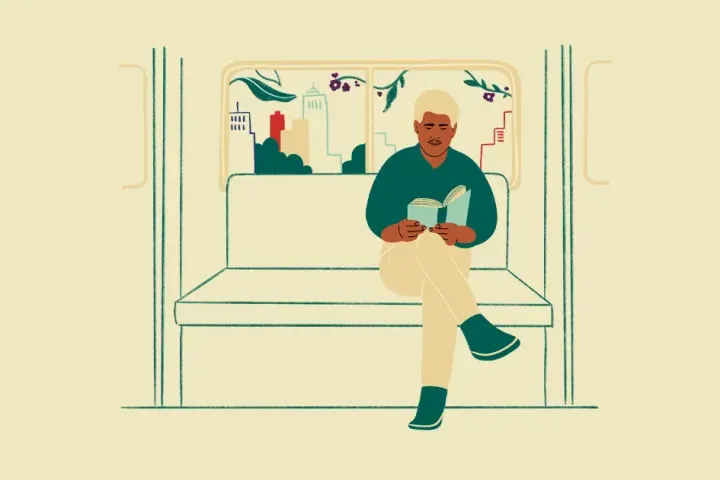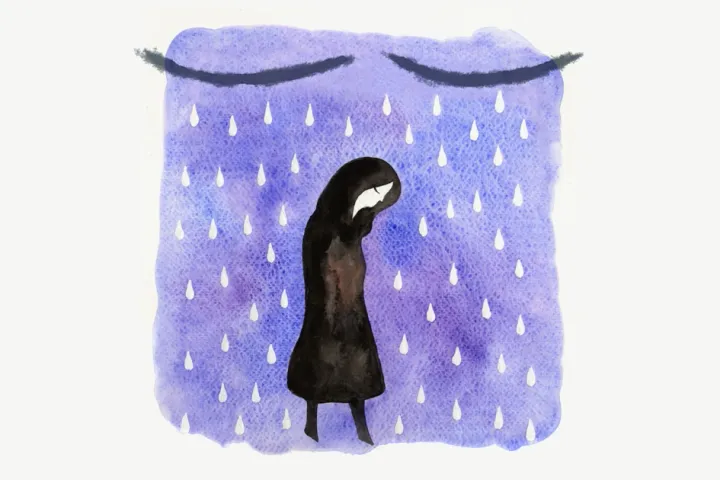Editor’s note: Each month, In Touch staff members respond to an excerpt from Dr. Stanley’s teachings. For this round, Jamie A. Hughes, C. Lawrence, and Renee Oglesby discuss the give-and-take of being in relationship with Jesus.
Scripture makes it clear that we have a relationship with God because of God (Rom. 5:6-11). He reached out while we were sinners and reconciled Himself to us. And yet, it’s not all on God to determine the closeness of our relationship—nor is it all on us. What exactly is our role and responsibility when it comes to knowing the Lord, and how much agency do we have? What does it look like to pursue a mutual relationship with Him? This month’s excerpt comes from Dr. Stanley’s sermon “Intimacy with God”:
Peter, James, and John chose how close they wanted to be with Jesus. They were not satisfied with simply knowing Him as a trainer. They wanted to get closer. They weren’t Jesus’ favorites—they’re the ones who chose to have an intimate relationship with Him. God doesn’t choose favorites. In Scripture, every single time without exception, it is God who takes the initiative to build an intimate relationship.

Renee: It sounds like a contradiction at first: “Peter, James, and John chose how close they wanted to be with Jesus.” Then, “In Scripture, every single time without exception, it is God who takes the initiative to build an intimate relationship.” But I suppose Jesus called the disciples into relationship, and then they chose the level of intimacy.
Jamie: Or perhaps their desire for closeness was enlarged through experiencing a relationship with Christ. Sometimes you don’t really know what you want until you begin the experience. And that fluctuates: Sometimes we are in a season when we feel very close to Him. Other times He seems more distant. It’s not a straight path.
C.: If we think about Jesus calling the disciples, the relationship began in those moments when He went and found them, and they responded. But then there’s a choice to be made within the relationship. Sort of like Jesus' question to the man at the pool of Bethesda: “Do you want to be healed?” In this case, we might ask, Do I want to be close?
Kayla: So what is your initial reaction to the idea that we're the ones who determine how close our relationship with Him is?
Renee: Relationships take time and effort—and sometimes feel wearying. But in my experience, I usually feel the tiredness before the effort, because after trying, I don’t regret the time and energy I gave and am thankful for doing so.
Jamie: Well, relationships involve choice, don’t they? You have to choose to give up other things to spend time with someone/something else. And that shapes some of who you are becoming.
Kayla: It would be easy to read Dr. Stanley’s quote and think it’s all on us. But I think what he means is that we have a responsibility in the relationship.
God is always with us, but a great deal of the time, we choose not to be present with Him.
C.: I see our responsibility in the relationship as actively choosing to remain, abide, be present with. God is always with us, but a great deal of the time, we choose not to be present with Him. This is about quality time with Him and in considerable quantity.
Kayla: The fact that God gives us that choice—what does it reveal about Him?
C.: It’s like Jesus’ disciples: The ones who leaned in and walked closely by His side had the richest relationship. They would likely have heard from Him most and observed most keenly His way of living, being, doing.
There’s definitely a gentleness and humility in Jesus allowing us to choose our level of devotion—our with-ness, if you will. But entering into a relationship with Jesus means entering into an ongoing exchange of love. Love has to be freely given and received.
Jamie: That makes me think of the Message translation of Matthew 11:28-30, about the taking on of a yoke: “Are you tired? Worn out? Burned out on religion? Come to me. Get away with me and you’ll recover your life. I’ll show you how to take a real rest. Walk with me and work with me—watch how I do it. Learn the unforced rhythms of grace. I won’t lay anything heavy or ill-fitting on you. Keep company with me and you’ll learn to live freely and lightly.”
Unforced, nothing heavy or ill-fitting—that’s what a relationship with God is.
Kayla: The words “keep company” stand out here. Initially Dr. Stanley’s quote invokes a great sense of responsibility, but the more we discuss, the emphasis seems to be on keeping company with God, and that’s so much lighter than my initial read.
Renee: The words “learn to live freely and lightly” feel like the opposite of some teaching I’ve received over the years, which always focuses on the “do” aspect of relationship with God and never on the “be” aspect.
Entering into a relationship with Jesus means entering into an ongoing exchange of love. Love has to be freely given and received.
C.: So much of life in Christianity has been weighed down by a sense of task keeping and obligation. But all of that is dead works, a performance, unless enlivened by love and expression of my free choice to give up my life for His life. “Keeping company” is a succinct way of locating where we ought to be—it’s simple but suggests a duration of time—a lifetime. Not to be glib, but maybe the advice could be summarized this way: Keep showing up. Keeping say yes to God’s companionship. Everything else flows from that.
Renee: I must like glib. That was a comforting way to put it.
Kayla: I’m curious if you ever picture the disciples—or someone you know—as God’s favorites?
C.: I don’t think so. But I do know people who distinctly seem to be good friends of God.
Jamie: And those people who seem to be closer to God—good friends with Him, as C. said—you want to know them. You want what they have. They’re just on a different level of life, not better or perfect, by any means. There’s a genuine humanness, a true humanity to them. That’s what we’re called to be, but so few of us manage it.
C.: I tend to chalk that up to their incredible humility, gentleness, patience, etc. There are some people I’ve been privileged to meet who remind me, in a profound way, of the Jesus I see in Scripture. And one of the things that’s most striking is that they aren’t bland, lacking-in-personality kinds of people. They’re unique and distinctly themselves while at the same time being Christlike.
Kayla: That's comforting.
C.: It makes sense, though, right? If our true self is hidden with Christ in God, then we should become more ourselves the more time we spend with Him.
Jamie: Exactly. We’re trying to tie a knot with only one arm. But we work ourselves to death trying to “get” somewhere or “make” ourselves into something.
If our true self is hidden with Christ in God, then we should become more ourselves the more time we spend with Him.
C.: That’s an apt comparison. Jesus says, Give up your life and you will find it, not Make your life into something. But what does it mean to give up one’s life? Coming back to the example of the disciples, it seems a lot like setting up your life to follow His call. To be with Him, no matter what.
Jamie: It’s always framed as sacrifice, but that’s not exactly right.
Renee: The disciples sacrificed to the extreme, though. They left their businesses and jobs and homes and families. Thankfully not everyone is called to do those things. But what does it look like for us?
C.: Maybe it’s more like choosing the better part. Think of Mary and Martha—it wasn’t that Martha did a bad thing by serving everyone that day. But Mary chose the better part. (See Luke 10:38-42). That’s uncomfortable for a doer like me.
Renee: I would totally be in the kitchen washing dishes with Martha.
C.: Me too. At my own birthday party years ago, I stayed in the kitchen the entire time keeping drinks and plates filled, rather than being with my beloved friends. I’ve been doing some version of that my whole life—with God, too.
Jamie: I feel that, C.
Renee: Me, too.
C.: If I’m being honest, “doing” is how I’ve felt worthy in life. If I’m not doing or producing or performing, what value do I have? It’s hard for me to accept or believe that I’m enough as I am.
Jamie: I have that same struggle.
At my own birthday party, I stayed in the kitchen keeping drinks and plates filled, rather than being with my beloved friends. I’ve been doing some version of that with God, too.
Renee: If you have a role to fulfill, a task to do, the requirements are usually pretty clear. You can hide in the doing of that task, on autopilot. But you can’t hide or autopilot your way to intimacy in a relationship.
Jamie: To be in a relationship is to leave oneself open to possibility. You can’t go into it expecting anything or directing how it goes or the timing. And when you do that, it’s usually so much better than anything you expected. It’s as though we’ve been playing with mudpies because we can’t fathom a holiday at the shore. (A very bad paraphrase of C. S. Lewis, but you get the point.)
Kayla: There's a large portion of my brain that wants to ask, “So what can we do to move closer to God?” But given all our talk about doing, maybe the question is, “What can we know or be to move closer to God?” I’m worried the question doesn’t make sense.
Renee: I love that question.
Jamie: Psalm 46:10 tells us, “Stop striving and know that I am God.” Maybe the answer is somewhere in there?
C.: What does it look like to stop striving? For doing to be subservient to being—for information to be secondary to formation?
Jamie: Formation happens at its own pace and according to its own plan. Whereas information is something we can control and direct, right? It’s the difference between getting a sermon outline with blanks in it and what we learn from our experiences with God—in the Scriptures, His church, and our life in the world. The former is prescriptive knowledge, and the latter is the kind we gain through revelation.
C.: So much of the time I feel the answer I get back on that kind of question or problem is, we need to read more, know more, and constantly remind ourselves of the truth. That’s all fine, but in my experience it’s not enough. How does this become a minute-by-minute lived experience of being with Jesus?
One of the ways we can do that is by being in fellowship, in communion, with one another. That means worshipping together, praying together, laughing together, eating together—all the togethers. And that’s not always easy, especially in our polarized age. But Christianity is incarnational—it’s an embodied faith. An in-person faith. If we want to keep company with God, we can’t turn our backs on one another.





